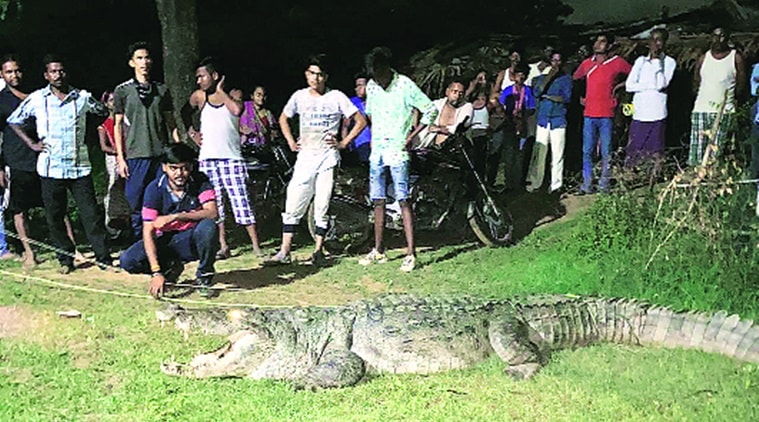 |
| The crocodile which killed a woman in Vadodara after its capture |
Every year in India during the monsoon season, rivers across the country burst their banks destroying anyone and anything in their path. But in some parts of the country, the floods inadvertently bring wildlife right to the people's doorstep. This is the case in Gujarat's Vadodara district where marsh crocodiles are known to swim upstream from nearby rivers during the monsoon season often ending up in city's waterways. The movement also leads to human-crocodile conflict in which people get killed during such encounters. This was recently a case in which a 13-foot crocodile attacked and killed a 54-year-old woman from Mahadevpura village in Vadodara's Waghodia taluka, who was washing clothes on the banks of Dev River on Friday. Responding to the attack, the villagers attempted to rescue the woman who was being dragged by her leg. The struggle lasted for an hour with the woman losing a major portion of her leg to the crocodile and succumbing to her injuries. A team of crocodile catchers led by an animal activist named Hemant Vadhwana joined forces with the forest department team led by Kashyap Patel in an effort to capture the crocodile. They set up a trap to lure the crocodile from the water. The process took 36 hours and once the animal emerged, a lasso was thrown around its neck and it was pulled out. The crocodile has now been handed over to the forest department.
 |
| Marsh crocodile in Gujarat |
I find it very disturbing that every monsoon season in Vadodara district sees incidences of human-crocodile conflicts and the tragedies associated with them. But what truly appalls me is that people inadvertently turned the crocodiles of Vadodara district into man-eaters over the years by dumping biomedical waste in the form of human body parts. It goes to show that man-eaters are man-made. This crocodile that recently killed a woman had also killed seven others--many of whom were washing clothes on the riverbank during a span of seven years. Its man-eating behavior is probably attributed to the consumption of human body parts dumped in one part of Dev River close to a charitable hospital for cancer patients. I strongly urge that measurements need to be taken to properly dispose of biomedical waste from hospitals in the vicinity of rivers where crocodiles reside. Dumping human body parts has been resulting in them to develop taste from human flesh and it is because of this that the villagers are constantly attacked and killed. I also believe that in order to prevent crocodile attacks, special barricades should be built in rivers to keep the crocodiles as far away from villagers as possible. This way, villagers can wash their clothes and vessels and bathe without fear of being attacked. Furthermore, efforts should be implemented in curbing the pollution levels of crocodile-filled rivers which includes removal of any biomedical waste.
View article here
No comments:
Post a Comment